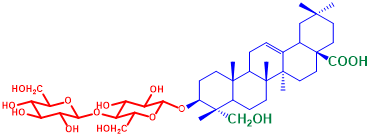EcoSap: triterpenoid saponins as green solutions for future sustainable food production.
EcoSap will evaluate the efficacy and environmental safety of saponins as a novel green solution for sustainable food production. Saponins are a natural defense compound in plants that exhibit detergent-like properties that can disrupt the cell membranes of herbivore pests, causing cell death.

Herbivore insects are very damaging to world food production. It is estimated that they consume
20-30% of the potential production; therefore, there is a global need for more effective yet environmentally friendly pesticides. Plants and insects have interacted for millions of years with the former evolving specialized defense mechanisms against herbivore insects – providing an untapped opportunity to find and explore bioactive compounds in plants as sources for biopesticides. Saponins are a class of such underutilized defense compounds. They exhibit detergent-like properties that can disrupt the cell membranes of herbivore pests, causing cell death. In the EcoSap project, we will learn from nature and investigate the potential of saponins as biopesticides as Green Solutions for future insect pest management. However, to do so, we first need to find out how plants that produce saponins avoid intoxication by their own defense, where in the plant saponins are stored, and their actual mode of action. We assume that saponins target membrane systems, but surprisingly, we do not know the mode of action – yet this is key for their exploitation as insecticides.
A major bottleneck to utilizing plant compound as insecticides is their availability and ability to scale up. In EcoSap, we will screen a number of plants and biowastes for saponins that have the correct structures to be insecticides. In collaboration with a bio-refinery plant, we will address and evaluate the potential of saponins for upscaling. Finally, we will perform a thorough evaluation of the efficacy of selected saponin structures by studying their effect on target and non-target organisms to facilitate their ecotoxicological and environmental safety evaluation. In this way, EcoSap will fully assess the untapped potential of saponins as a novel green solution for sustainable food production going from mode-of-action, to upscaling, to evaluation of their efficacy and environmental safety.
The following partners are involved in the project
- University of Copenhagen
- University of Bochum, DE (links at bottom of page)
- Rothamsted Research, UK
- Dansk Bioindustri ApS
See below which individual researchers are involved
Internal Participants
| Name | Title | Phone | |
|---|---|---|---|
| Search in Name | Search in Title | Search in Phone | |
| Anja Thoe Fuglsang | Professor | +4535332586 | |
| Jincheng Shen | Research Assistant | +4535321078 | |
| Malbor Dervishi | Research Assistant | +4535329391 | |
| Nina Cedergreen | Professor | +4535333397 | |
| Pablo D. Cárdenas | Assistant Professor | +4535333289 | |
| Rajeswari Gopal Geetha | Postdoc | +4535334544 | |
| Søren Bak | Professor | +4535333346 |
External Participants
| Linda M Field | Insect Molecular Biologist | Rothamsted Research | |||
| Thomas Günther-Pomorski | Professor | University of Borchum | |||
| Orla Møller Petersen | CEO | Dansk Bioindustri ApS |
Contact
Søren Bak
Professor
bak@plen.ku.dk
+4535333346
Katja Annette Willrodt
Project Manager
kwi@plen.ku.dk
+4535325828
